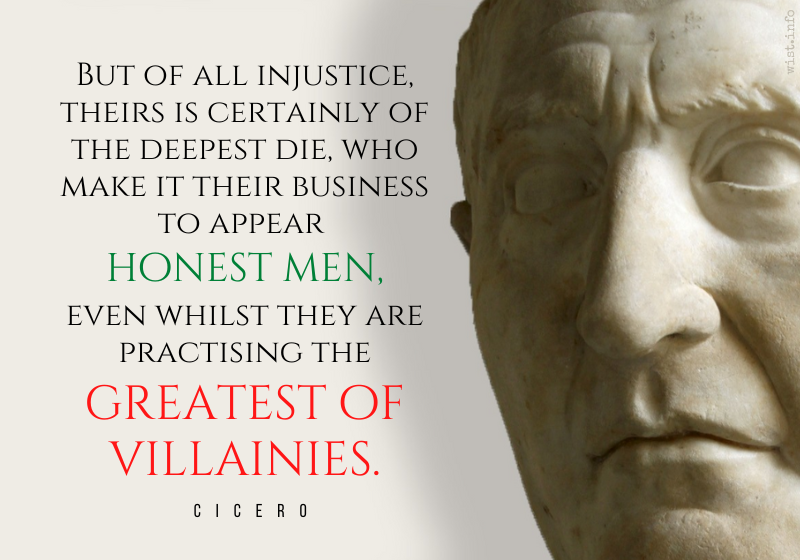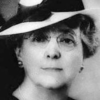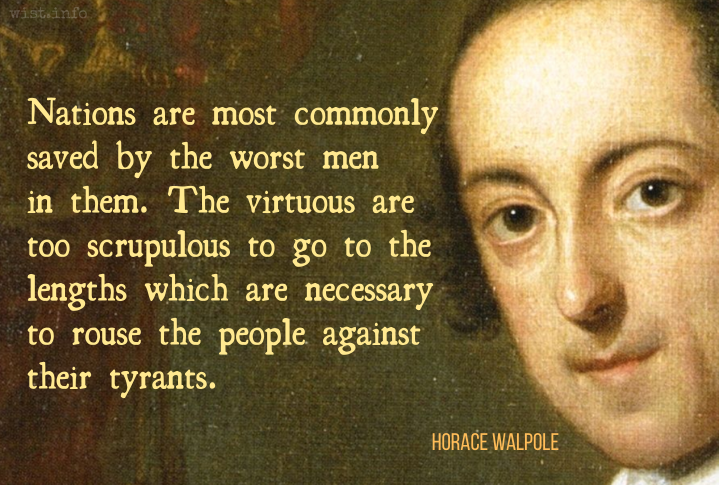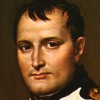Call me a scoundrel, only call me rich!
All ask how great my riches are, but none
Whether my soul is good.[ἔα με κερδαίνοντα κεκλῆσθαι κακόν]
Euripides (485?-406? BC) Greek tragic dramatist
Bellerophon [Βελλεροφῶν], frag. 181 (Nauck, TGF) (c. 430 BC) [tr. Gummere (1925)]
(Source)
Barnes frag. 65. Found (in Latin) in Seneca, Epistulae morales ad Lucilium, 115.14:Sine me vocari pessimum, ut dives vocer.
An dives, omnes quaerimus, nemo, an bonus.
(Source (Greek)). Alternate translations:If any gain ensue, I am content.
To be term'd wicked. We all ask this question,
Whether a man be rich, not whether virtuous.
[tr. Wodhull (1809)]Let me be called a scoundrel, but a rich one.
We all ask if he’s rich, not if he’s good.
[Source]
Quotations about:
villain
Note not all quotations have been tagged, so Search may find additional quotes on this topic.
In the theater, as in life, we prefer a villain with a sense of humor to a hero without one.
Mignon McLaughlin (1913-1983) American journalist and author
The Neurotic’s Notebook, ch. 7 (1963)
(Source)
But of all injustice, theirs is certainly of the deepest die, who make it their business to appear honest men, even whilst they are practising the greatest of villainies.
[Totius autem iniustitiae nulla capitalior quam eorum, qui tum, cum maxime fallunt, id agunt, ut viri boni esse videantur.]
Marcus Tullius Cicero (106-43 BC) Roman orator, statesman, philosopher
De Officiis [On Duties; On Moral Duty; The Offices], Book 1, ch. 13 (1.13) / sec. 41 (44 BC) [tr. Cockman (1699)]
(Source)
(Source (Latin)). Alternate translations:No act of injustice is more pernicious than theirs, who while they are attempting the greatest deceit, labor to appear good men.
[tr. McCartney (1798)]But in the whole system of villainy, none is more capital than that of the men, who, when they most deceive, so manage as that they may seem to be virtuous men.
[tr. Edmonds (1865)]But of all forms of injustice, none is more heinous than that of the men who, while they practise fraud to the utmost of their ability, do it in such a way that they appear to be good men.
[tr. Peabody (1883)]The most criminal injustice is that of the hypocrite who hides an act of treachery under the cloak of virtue.
[tr. Gardiner (1899)]No iniquity is more deadly than that of those who, when they are most at fault, so behave as to seem men of integrity.
[ed. Harbottle (1906)]But of all forms of injustice, none is more flagrant than that of the hypocrite who, at the very moment when he is most false, makes it his business to appear virtuous.
[tr. Miller (1913)]Taking all forms of injustice into account, none is more deadly than that practiced by people who act as if they are good men when they are being most treacherous.
[tr. Edinger (1974)]
I will accept that sometimes a villain has to die, but I’ll be damned if I’ll take free drinks for doing it.
Phil Foglio (b. 1956) American writer, cartoonist
Agatha H. and the Clockwork Princess [Barry Heterodyne] (2012) [with Kaja Foglio]
(Source)
Sparks are a secretive lot, and they keep their blasphemous secrets held close to their vests. On average, a good Spark will invest anywhere from one-half to two-thirds of his or her time and energy on the design and hiding of an elaborate lair, as they seem to have an instinctual understanding that people work best in an environment where the controls to all the deathtraps are right at their fingertips. This is a good thing, overall, as time spent digging an elaborate “Maze of Madness” is less time spent trying to find a way to turn the nearest city into a beautiful volcanic moonscape.
Phil Foglio (b. 1956) American writer, cartoonist
Agatha H and the Voice of the Castle (2014) [with Kaja Foglio]
(Source)
I’d write a story once in a while, but I wouldn’t pester editors with it. I’d write of people and places like I knew, and I’d make my characters talk everyday English; and I’d let the sun rise and set in the usual quiet way without much fuss over the fact. If I had to have villains at all, I’d give them a chance, Anne — I’d give them a chance. There are some terrible bad men in the world, I suppose, but you’d have to go a long piece to find them — though Mrs. Lynde believes we’re all bad. But most of us have got a little decency somewhere in us.
Lucy Maud Montgomery (1874-1942) Canadian author
Anne of the Island, ch. 12 [Mr. Harrison] (1915)
(Source)
“Why did you kill Maurice Lennox?” she asked reproachfully.
“He was the villain,” protested Anne. “He had to be punished.”
“I like him best of them all,” said unreasonable Diana.
“Well, he’s dead, and he’ll have to stay dead,” said Anne, rather resentfully. “If I had let him live he’d have gone on persecuting Averil and Perceval.”
“Yes — unless you had reformed him.”
“That wouldn’t have been romantic, and, besides, it would have made the story too long.”
Charming villains have always had a decided social advantage over well-meaning people who chew with their mouths open.
Judith Martin (b. 1938) American author, journalist, etiquette expert [a.k.a. Miss Manners]
Common Courtesy, “In the Quest for Equality, Civilization Itself Is Maligned” (1985)
(Source)
Originally published in The New Republic in 1984.
In retrospect, though many were guilty, none was innocent. The purpose of political activity is to provide peace and prosperity; and in this every statesman failed, for whatever reason. This is a story without heroes, and perhaps even without villains.
A. J. P. Taylor (1906-1990) British historian, journalist, broadcaster [Alan John Percivale Taylor]
The Origins of the Second World War, ch. 1 (1961)
(Source)
ORESTES: A terrible thing is the mob, whenever it has villains to lead it.
PYLADES: But with honest leaders its counsels are always honest.[Ὀρέστης: δεινὸν οἱ πολλοί, κακούργους ὅταν ἔχωσι προστάτας.
Πυλάδης: ἀλλ᾽ ὅταν χρηστοὺς λάβωσι, χρηστὰ βουλεύουσ᾽ ἀεί.]Euripides (485?-406? BC) Greek tragic dramatist
Orestes, ll. 772-773 [Orestes] (408 BC) [tr. Coleridge (1938)]
(Source)
Original Greek. Alt. trans.:ORESTES: Ah, my friend! When mobs have rotten leaders they are likely to do all sorts of nasty things.
PYLADES: It's a very different story when their leaders are wise, though ....
[tr. Theodoridis (2010)]ORESTES: The mob is frightening when their leaders are criminal.
PYLADES: But when they have good one, their decisions are good.
[tr. Luschnig (2013)]ORESTES:
The mob is nasty, when it has leaders
bent on doing wrong.
PYLADES:
But when it’s controlled
by decent men, the decisions they make
are always good.
[tr. Johnston (2020), ll. 938-940]The masses are terrible whenever they have scoundrels as leaders.
[tr. @sententiq (2020)]
“People aren’t either wicked or noble,” the hook-handed man said. “They’re like chef salads, with good things and bad things chopped and mixed together in a vinaigrette of confusion and conflict.”
Nations are most commonly saved by the worst men in them. The virtuous are too scrupulous to go to the lengths which are necessary to rouse the people against their tyrants.
Horace Walpole (1717-1797) English novelist, letter writer
Memoirs of the Reign of King George III, Vol. 1, ch. 12 (1859)
(Source)
Variants:
- "The adventurer's career suggests the reflection that nations are usually saved by their worse men, since the virtuous are too scrupulous to go to the lengths needed to rouse the people against their tyrants." (Source)
- "The virtuous are too scrupulous to go to the lengths that are necessary to rouse the people against their tyrants."
- Modern paraphrase: "No great country was ever saved by good men because good men will not go to the lengths necessary to save it."
- Modern paraphrase: "No great country was ever saved by good men, because good men may not go to the lengths that may be necessary."
The ratio of damn fools to villains is high.
We so want heroes, and we want to think that someone who is good and inspirational in some ways is good and inspirational in all ways — a dubious proposition even in modern times, let along fifty, a hundred, two hundred years ago or more. Which then lets us exercise that other instinctive desire: we so want villains ….
No one just starts giggling and wearing black and signs up to become a villainous monster. How the hell do you think it happens? It happens to people. Just people. They make questionable choices, for what might be very good reasons. They make choice after choice, and none of them is slaughtering roomfuls of saints, or murdering hundreds of baby seals, or rubber-room irrational. But it adds up. And then one day they look around and realized that they’re so far over the line that they can’t remember where it was.
Man is neither villain nor hero; he is rather both villain and hero.
Martin Luther King, Jr. (1929-1968) American clergyman, civil rights leader, social activist, preacher
Strength to Love, ch. 11 “What Is Man?” (1963)
(Source)
Describing a more realistic view of humanity neither in "the thesis of pessimistic materialism nor the antithesis of optimistic humanism."
HAMLET: O villain, villain, smiling, damnèd villain!
My tables — meet it is I set it down
That one may smile and smile and be a villain.William Shakespeare (1564-1616) English dramatist and poet
Hamlet, Act 1, sc. 5, l. 113ff (1.5.113-115) (c. 1600)
(Source)



















